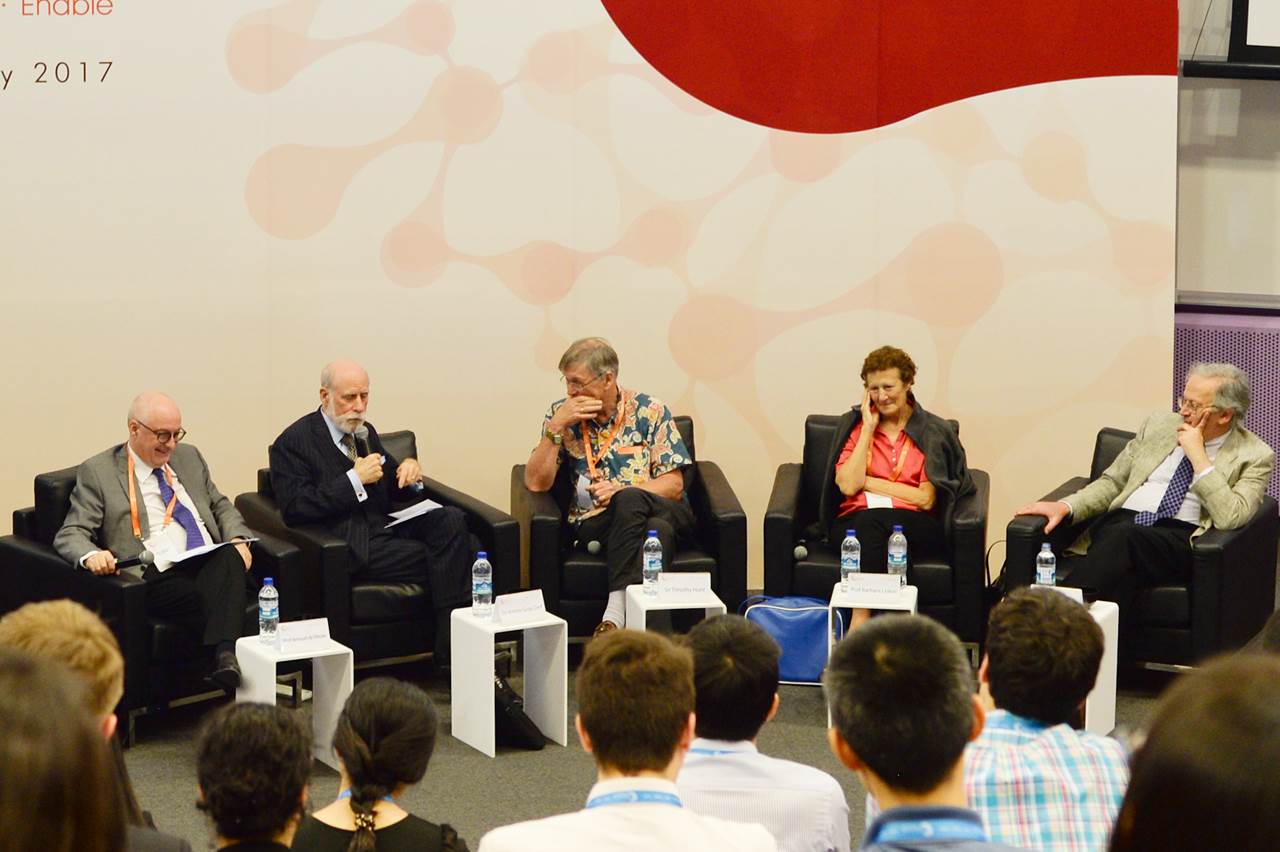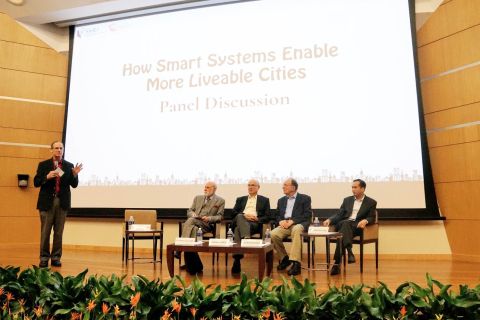
By Sim Shuzhen
SMU Office of Research & Tech Transfer – What drives scientists to devote their lives to working on seemingly intractable problems? Intense curiosity, an obsession with getting to the bottom of things, and the ability to see failure in a positive light, said a panel of eminent scientists at the Global Young Scientists Summit 2017 (GYSS 2017), held from 15-20 January at the Singapore University of Technology and Design.
The panel, which discussed the topic ’What Inspires You?’, was moderated by Singapore Management University (SMU) President Professor Arnoud De Meyer, and comprised Turing Award winners Dr Vinton Gray Cerf (2004), Professor Barbara Liskov (2008) and Professor Leslie Valiant (2010), as well as Nobel Laureate Sir Timothy Hunt (Physiology or Medicine, 2001).
The power of childlike curiosity
Professor De Meyer opened the discussion by asking the panellists how they got started in their careers, and what keeps them going.
Professor Valiant, an artificial intelligence pioneer who developed the Probably Approximate Correct (PAC) model of machine learning, said that in his view, there are two parts to becoming a successful scientist.
“On one hand you have to be childlike and naive, and ask very simple questions,” he said. “But on the other hand, science also has a technical side, which you have to master. The interaction of these two has always fascinated me.”
Dr Cerf, who co-invented TCP/IP, the computer protocol that forms the fundamental architecture of the internet, echoed the importance of preserving a childlike curiosity.
“I feel this innate curiosity - I hope I never grow up. Growing old you have to do, but growing up is a choice you can make,” he said. Young aspiring scientists, then, should strive to keep their sense of wonder intact.
Sir Tim, who discovered cyclins - key proteins that control the process of cell division - said that important problems in biology can take many years to unravel. What keeps him going, he said, is the niggling feeling that the simplest of solutions may be hiding in plain sight.
“You just have to keep pushing, pulling and tweaking at the margins all the time, and keep going at that one obsession,” he said. “I think it’s really important to have something that obsesses you.”
The importance of not planning
Professor Liskov, whose pioneering work in data abstraction has since shaped all modern day computer programming languages, said that she got into the field of computer science by accident, when she decided to get a job as a programmer instead of going to graduate school in mathematics.
“I didn’t even know computers existed,” she remembered. “I discovered them on my first job, when I was handed a Fortran manual and given a programme to solve.”
Yet, the field turned out to be perfect for her - she discovered that besides being able to use her background in mathematics, she also had an innate affinity for thinking as an engineer.
“I like to build things that work,” she said. “The fact that I’m building practical things, as well as thinking carefully about them, is what motivates me to go on.”
Dr Cerf also noted that it is nearly impossible to chart out one’s career from the start.
“People come to me for help with planning their careers. My answer is: don’t, because you can’t - man plans, God laughs,” he said. “What’s important is to know what you’re good at, what excites you and what makes you passionate, and then be on the lookout for opportunities that let you exercise that. For me, all the interesting things I’ve ended up doing were not things I had anticipated or planned.”
The panel also advised young scientists to choose problems that not only interest them, but which they also had the aptitude or background to tackle. Professor Liskov added that intellectual honesty - being aware of what you don’t know as much as what you do know - is a very important aspect of becoming a successful scientist.
Non-linear progress
Given that scientific career paths - and in fact science itself—can sometimes be non-linear and unpredictable, can we really trust funding agencies to predict, and hence dictate, which areas of research are considered important?
For Sir Tim, the answer is a resounding no. “If you’re honest, you have absolutely no idea what’s going to happen in the future, because it’s all just chance,” he said.
Dr Cerf stressed the importance of basic research, which often does not have clear or immediate applications.
“Sometimes, the knowledge gained from a piece of research may have a dramatic effect fifty years later - we just can’t predict what it is,” he said. “Finding agencies willing to fund curiosity-based research is very important.”
As things stand today, he added, basic research of Nobel Prize-winning calibre is not going to come out of the private sector. Governments, therefore, will need to channel serious resources into deep, fundamental research, he said.
Seeing failure from a different perspective
For despairing graduate students struggling in the laboratory or pulling all-nighters to debug their code, the panel had some words of encouragement. Failure, they said, was part and parcel of research, and one had to learn not to be frustrated by it. In fact, it is possible - even important - to see failure in a positive light.
“Every time something doesn’t work, you make a little bit of progress towards what will work,” said Professor Liskov. “I don’t even think of it as failure.”
“If you’re in the software business, most programmes don’t work - they have bugs,” said Dr Cerf. “But there’s a hope that you can figure out what doesn’t work, and learn from it. Most science advances precisely because stuff doesn’t work, and you have to figure out why.”
Agreeing, Professor De Meyer said that obsession with a question must sometimes be combined with perseverance. “Not everything will always go the way you want, so you need the courage to persevere,” he said.
Back to Research@SMU Issue 43
See More News
Want to see more of SMU Research?
Sign up for Research@SMU e-newslettter to know more about our research and research-related events!
If you would like to remove yourself from all our mailing list, please visit https://eservices.smu.edu.sg/internet/DNC/Default.aspx

